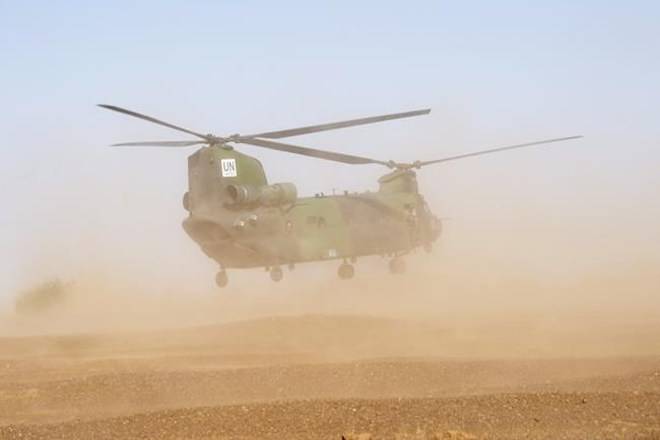Canadian peacekeepers in Mali launched their second medical-evacuation mission in less than a week after a UN armoured vehicle triggered an explosive device Friday, killing two and wounding six others.
The attack occurred near the town of Douentza in central Mali, about 400 kilometres southwest of Gao, where the Canadian contingent of 250 peacekeepers and eight military helicopters is based.
The Department of National Defence says the Canadians rescued five injured peacekeepers from the scene and provided emergency medical treatment while in the air.
The UN identified the dead and injured peacekeepers as having come from Sri Lanka.
READ MORE: Trudeau defends pace of peacekeeping deployments as next election looms
Canadian peacekeepers have conducted seven medevacs since operations began in August, including one last Sunday following a deadly assault on a UN camp in northern Mali.
That attack killed 10 peacekeepers from Chad and injured at least dozens more. The Canadians ended up carrying away 15 peacekeepers on their busiest day since arriving in the country.
Friday’s attack was condemned by the UN Security Council, which called on the Malian government and other actors in the strife-riven country to identify those responsible and hold them to account.
“We extend our deepest condolences to the loved ones of the blue helmets who tragically lost their lives this morning in Mali,” Defence Department spokesman Daniel Le Bouthillier said in a statement.
“Following a request for assistance, Canadian peacekeepers immediately launched aeromedical assets to provide advanced care to those injured in the attack.”
Mali remains the home of the most dangerous peacekeeping mission in the world, with Friday’s deaths bringing the total number of fatalities since 2013 to 189. Many of those have been from developing countries in Africa and Asia.
READ MORE: No letup for Trudeau as difficult 2018 gives way to wild election year
The 15,000-strong UN mission followed a rebellion in the north and a coup in the capital in 2012 that threw the country into turmoil.
While a tenuous peace was re-established, recent years have seen a resurgence in violence among different groups thanks to poverty, drought and an influx of Islamic jihadists.
Two different groups, both linked to al-Qaida, have reportedly claimed responsibility for this week’s attacks.
Canada’s year-long mission is scheduled to end in July, at which point the Canadians will pack up and start heading home. The UN would like Canada to stay until Romanian troops arrive in the fall but the government has rejected an extension.
Lee Berthiaume, The Canadian Press



